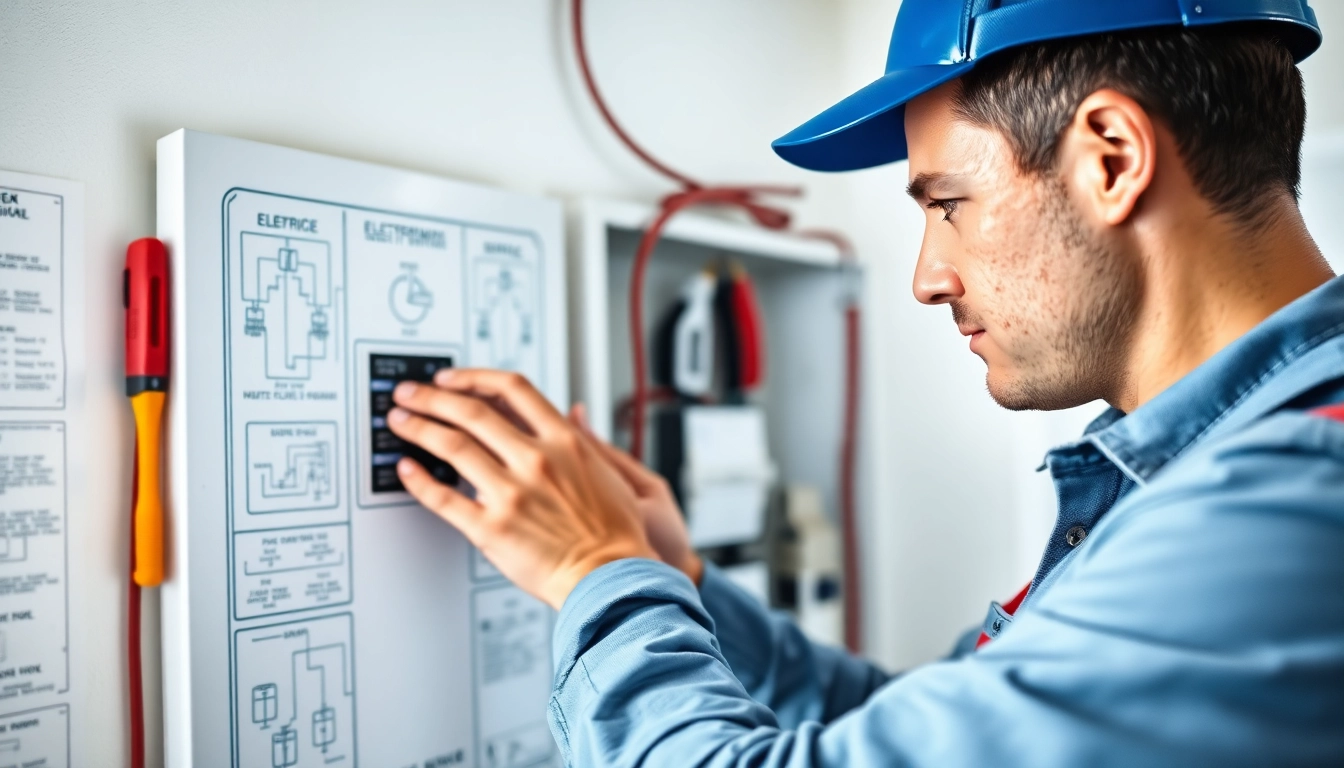Understanding Electrical Panels
What is an Electrical Panel?
An electrical panel, often referred to as a breaker box or distribution board, is a vital component of your home’s electrical system. It acts as a central hub that distributes electricity to different circuits within your home, ensuring that all electrical devices receive a stable and adequate power supply. Typically made from metal, an electrical panel houses various circuit breakers or fuses that correspond to various electrical circuits running through your home.
The panel is connected to your main power supply, allowing it to manage the electricity flow. It comprises a main breaker that controls the electricity entering the house and a series of smaller breakers that power individual circuits. Understanding its functionality is crucial for homeowners, especially when considering upgrades or repairs. For residents in Clearwater seeking more information, the nuances of an Electrical Panel Clearwater can often differ due to local code requirements and energy demands.
Importance of Electrical Panels in Clearwater Homes
In Clearwater, where homes can range from beachfront properties to modern apartments, the electrical panel plays a crucial role in the safety and efficiency of the electrical system. With increasing reliance on electrical devices and appliances, older panels may struggle to meet modern electrical demands. In regions prone to storms and hurricanes, ensuring your electrical panel is up to code can be essential for safety and power restoration after outages.
Moreover, as homes undergo renovations or expansions, the need for an upgraded electrical panel becomes paramount. A properly functioning panel not only ensures a steady power supply but also enhances safety by reducing the risk of electrical fires and equipment damage due to overload.
Common Electrical Panel Types and Their Features
There are several types of electrical panels available, each offering specific features suited for different electrical loads and requirements:
- Main Breaker Panel: This is the most common type found in residential properties. It includes a main breaker that can shut off all electricity to the home and additional circuit breakers for various appliances and outlets.
- Subpanels: These are smaller panels that can be added to distribute power to specific areas of the home, such as a garage or workshop, easing the load on the main panel.
- Smart Panels: An emerging trend, smart panels allow homeowners to monitor and control their power consumption through digital interfaces, providing insights into energy use and potential savings.
Choosing the right type of electrical panel is essential for both safety and performance, especially in a bustling area like Clearwater where energy demands can fluctuate significantly.
Signs You Need to Upgrade Your Electrical Panel
Frequent Circuit Breaker Trips
If you find yourself frequently resetting your circuit breakers, it’s a clear indication that your electrical panel is struggling to handle the demand within your home. Over time, household appliances and devices increase in number, amplifying the energy load. Frequent tripping can lead to frustration and may pose safety risks.
Moreover, numerous trips indicate that the existing panel is overloaded. Perhaps it’s time for a panel upgrade that accommodates not just your current demands but also any potential future needs.
Home Renovations and Updated Electrical Needs
Home renovations, additions, or changes in energy usage can warrant an electrical panel upgrade. If you’re installing new appliances, such as electric ovens or HVAC units, these devices require dedicated circuits that an older panel may not support adequately.
Additionally, if you’ve converted your garage into a living space or added a home office, these areas will likely demand more power than the original electrical system can provide. Upgrading your panel will not only enhance functionality but also ensure compliance with current electrical codes.
Age and Condition of Existing Panels
Electrical panels can last anywhere from 20 to 30 years, but older panels may lack the capacity to support modern energy demands. If your electrical panel is nearing the end of its lifespan, consider upgrading it before it fails. Signs of wear and tear, rust, or scorch marks can indicate deeper underlying issues that could pose safety hazards.
Moreover, outdated panels often lack important safety features found in newer models, increasing the risk of electrical fires and system failures. Knowing when to upgrade is crucial for both safety and efficiency.
Choosing the Right Electrical Panel
Factors to Consider When Selecting an Electrical Panel
When choosing a new electrical panel, several factors should guide your selection:
- Load Capacity: Assess the total power requirements of your home. Calculate the wattage of all your appliances and devices to determine the necessary load capacity of the panel.
- Future Needs: Consider any potential future upgrades or expansions—like the addition of electric vehicles or home automation systems—that might increase your energy demand.
- Safety Features: Look for panels that include safety features such as surge protection, AFCI (Arc-Fault Circuit Interrupter), and GFCI (Ground-Fault Circuit Interrupter) breakers to enhance safety.
Taking the time to carefully evaluate these factors ensures that you choose a panel that meets your current and future electrical needs.
Understanding Load Capacity and Ratings
Load capacity refers to the total amount of electrical load that a panel can handle safely. Most residential electrical panels in Clearwater are rated between 100 amps to 200 amps. Understanding the load capacity and ratings helps homeowners avoid overloading the panel, which can be hazardous.
While 100-amp panels may suffice for smaller homes, families with high energy consumption, particularly those utilizing multiple heavy-duty appliances, may require a 200-amp panel. Consult with a professional electrician to accurately assess your load capacity and make an informed choice based on your specific situation.
Comparing Different Brands and Models
Quality matters when selecting an electrical panel, and the market boasts various brands known for reliability and safety. Key players include Square D, Eaton, and Siemens, each offering different product lines tailored to various applications.
Research and compare features, warranties, and pricing among these brands to find the best fit for your electrical needs. Reviews from other Clearwater residents can also provide practical insights into which brands have performed well in the local context.
The Upgrade Process
Steps to Prepare for an Electrical Panel Upgrade
Preparing for an electrical panel upgrade involves several key steps:
- Assessment: Begin by assessing your current panel’s capacity and condition. Identify any issues or areas where the panel falls short.
- Planning: Create a comprehensive plan outlining your electrical needs now and for the future. This includes determining the necessary load capacity and types of circuits required.
- Consultation: Contact a licensed electrician in Clearwater to discuss your findings and get professional recommendations tailored to your needs.
Thorough preparation ensures a smoother transition to your new electrical panel and minimizes potential issues during installation.
Hiring a Qualified Electrician in Clearwater
Hiring a professional electrician is vital to the success of your panel upgrade. Look for licensed and insured electricians with significant experience in residential electrical work. Seek recommendations from friends or family, or check online reviews.
Competence is crucial; a qualified electrician will ensure that the upgrade complies with local codes and standards, ultimately protecting your home and family from potential hazards.
What to Expect During the Upgrade
The upgrade process generally involves several stages:
- Power Shutoff: Your electrician will begin by shutting off the power to the current panel.
- Removal: The old panel will be removed, and any necessary adjustments to wiring or circuits will be made.
- Installation: The new panel will be installed, including securing connections and mounting it correctly.
- Testing: After installation, the electrician will test the panel and circuits to ensure everything functions correctly and safely before restoring power.
Understanding these steps can help prepare you for the installation process and set appropriate expectations.
Maintaining Your Electrical Panel
Routine Checks and Inspections
Post-installation, maintaining your electrical panel is essential for long-term safety and performance. Regular inspections help identify potential issues before they become significant problems. Check for any signs of wear, such as rust or unusual sounds coming from the panel.
Consider scheduling an annual inspection with a qualified electrician to ensure everything is functioning correctly and safely. This practice can also keep your electrical setup compliant with local electrical codes.
Common Maintenance Tips for Homeowners
As a homeowner, some simple maintenance tips include:
- Keep the Area Clear: Ensure the area around the electrical panel is clutter-free, making it easier for you or a professional to access the panel when necessary.
- Check Breakers: Regularly check your circuit breakers for any that seem to be tripping frequently, as this could indicate a fault or a need for attention.
- Visual Inspections: Look for burn marks, scorch marks, or unusual corrosion, as these signs may point to deeper electrical issues that require immediate attention.
Implementing these tips not only prolongs the lifespan of your electrical panel but also enhances the safety of your home.
When to Call a Professional for Electrical Panel Issues
If you experience ongoing problems, such as persistent breaker trips, flickering lights, or signs of physical degradation (like burn marks or rattling), it’s crucial to call a professional immediately. Ignoring these issues can lead to more severe safety hazards, including electrical fires.
Additionally, if you’re unsure about your panel’s condition or functionality, consulting with an experienced electrician can ensure that any necessary repairs or upgrades are managed safely and effectively.



